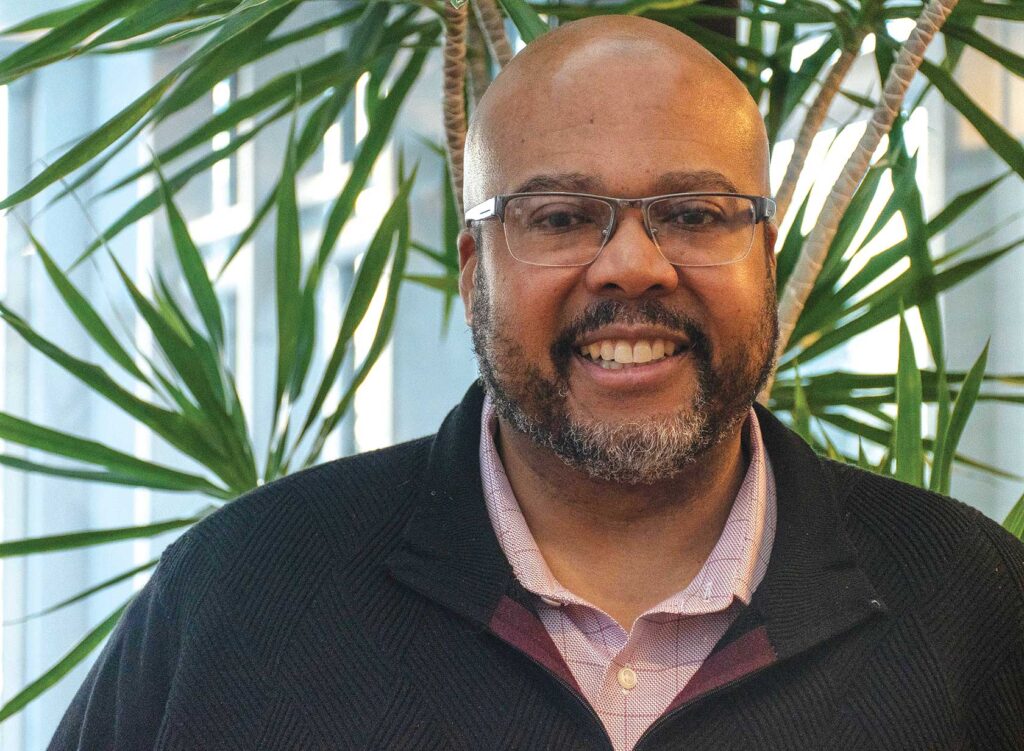Kerry Bowie builds diversity bridge between green-tech science and commerce

A self-described “jack-of-all-trades,” Kerry Bowie has tried his hand at a number of jobs while moving through the orbit of environmental fields. Throughout it all, he’s been driven by the goal of putting science to use by and for the broadest possible community.
“Science and engineering can’t just be rogue,” he said. “What are you doing with it?”
In 2020, he helped found Browning the Green Space, a nonprofit that works to increase the share of people of color in the green tech industry, with a focus on creating jobs, building wealth and reducing energy burdens.
As an undergraduate studying environmental engineering at MIT, Bowie mixed lab and field work through an internship with the Massachusetts Water Resources Authority, testing water quality during the Boston Harbor cleanup project.
Out of college, he worked on the technical staff at Texas Instruments. A stint in governmental leadership took him through nine years under the Deval Patrick and Charlie Baker administrations — 18 months in the Executive Office of Energy and Environmental Affairs and another half-year in the Department of Environmental Protection, where he worked on brownfields, environmental justice and food access.
Most recently, Bowie, who originally grew up in Alabama but is now a Somerville resident, turned his eye to the business world — he got his third degree, an MBA from MIT in 2006 — where much of his work bridges with his engineering background through a focus on diversity and equity in science, technology, engineering and math, especially clean energy technologies.
Bowie also started an investment fund in 2021, Malaika Ventures, focused on innovation and green technology. He said he and his partners in the effort are still raising money, but they’re aiming to create an $80 million fund.
In the face of a growing climate crisis, he said he thinks the work is going to need more diverse perspectives.
“When we don’t have Black, brown, Latinx and Indigenous people, we’re missing out on solutions,” Bowie said. “Diverse teams are better teams; I think there’s just different lived experiences.”
Daryl Wright, chief strategy officer for the Emerald Cities Collaborative, said the transition to clean energy presents an opportunity to correct some of the structural inequities that have been created in the past as the growing industry looks to fill more jobs.
“It’s not just a good-to-do, it’s a must-do,” said Wright, who also chairs Browning the Green Space’s committee on contracts.
Overall representation of workers of color in clean energy hovers around 25%, according to a 2022 workforce report from the Massachusetts Clean Energy Center. While higher than their share in the overall state workforce, Black workers are under-represented in key roles, including management positions.
As the city and state mount a growing effort to address diversity in other industries, like life sciences, Bowie said he sees similar motion in environmental technologies, even if it’s at a slower pace.
“This is the best place in the world to get sick, like you throw a stick and you hit a world class health care center. We’re trying to do that with clean energy, we were just a little bit behind,” he said.
Collaborators in the field highlighted Bowie’s ability to inspire others.
Amanda Downey, a Browning the Green Space board member and vice president of business performance and planning at National Grid, said Bowie has the ability to help people believe in who they are and what they stand for.
“He makes people who work with him feel like the work that really needs to be done really needs to be done together,” Downey said. “There’s a role for each and every one of us to play.”
That ability to inspire is an important step to building trust with communities of color said Joe Curtatone, former Somerville mayor and current president of the Northeast Clean Energy Council.
“We will not succeed if we do not earn that credibility and trust,” he said. “We will not succeed if the opportunities are not genuine and authentic.”
But Bowie, he said, approaches work in a way that can build those connections by engaging and serving as a resource.
That plays out on the ground. Shonte Davidson worked as a supplier diversity program manager for Eversource before she used a Browning the Green Space program called Accelerating Contractors of Color in Energy for Sustainable Success — or ACCESS — to launch her own business, Impact Energy, a workforce development and project installation firm focused on green technologies and diversity within the industry.
Davidson said Kerry makes the scary process of jumping out on her own a little more comfortable by providing access to social capital — Wright highlighted Bowie’s ability to connect with both advocates working in the environmental justice space and people from the venture capital side. Davidson said Bowie continues to make himself available as a resource, staying available for phone call check-ins and guidance as she continues the business he pushed her to start.
As the field continues to grow, Curtatone said that it is important that communities of color not only work in the field but also have a voice.
“We need a whole-of-society approach. We need all those hands and all those perspectives and everyone’s work collectively to get it done, and that means you can’t just give folks a seat at the table,” Curtatone said. “Who owns the work? There are instances when others who have that perspective must lead in owning that work.”
That, too, is part of Bowie’s vision for a clean energy transition.
“I’m hopeful that you know we’re going to be not just at the table, but setting the table leading companies pushing policy,” Bowie said.






